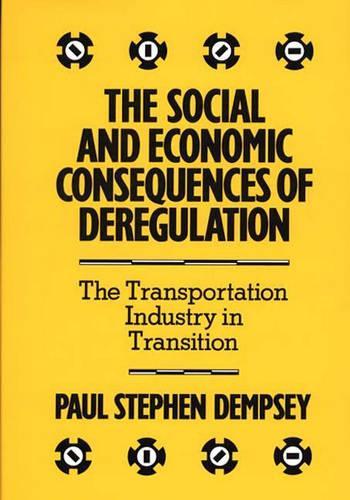
The Social and Economic Consequences of Deregulation: The Transportation Industry in Transition
(Hardback)
Publishing Details
The Social and Economic Consequences of Deregulation: The Transportation Industry in Transition
By (Author) Paul S. Dempsey
Bloomsbury Publishing PLC
Praeger Publishers Inc
11th September 1989
United States
Classifications
Tertiary Education
Non Fiction
388.0973
Physical Properties
Hardback
293
Description
The author discusses the question of federal preemption of intrastate transportation and the experience of intrastate deregulation in some states. He examines the issue of whether more deregulation is in the public interest and, if economic deregulation is to be retained, what form it should take. The author's summary and conclusions can be the basis for study of the effects of economic deregulation in the transportation industry. This book can be a resource for executives dealing with deregulation in such industries as: transportation, telecommunications, broadcasting, electric utilities, cable television, oil and gas, and securities and banking. Defense Transportation Journal This book provides a comprehensive assessment of the social nd economic consequences of one of America's most important infrastructure industries--transportation. Dr. Dempsey traces the legal and political movement from regulation to deregulation. He proceeds to review the empirical results of a decade of deregulation upon airlines, railroads, trucking, and bus companies, and the effects of deregulation upon the shipping and traveling public that rely upon them. The book begins with an analysis of the events that led our nation to establish a regime of economic regulation upon the transportation industry. It also examines the metamorphosis toward deregulation and focuses on several areas in which there has been a significant adverse impact, including economic efficiency, pricing, service, and safety. Dempsey's book addresses the question of federal preemption of intrastate transportation and the experience of intrastate deregulation in some states. Dempsey further examines the issue of whether more deregulation is in the public interest and, if economic regulation is to be retained, what form it should take. The book concludes with an analysis of the public interest in transportation, focusing upon the policy objectives essential in accomplishing social and economic goals beyond allocative efficiency. This book is a necessary resource for executives dealing with deregulation in such industries as: transportation, telecommunications, broadcasting, electric utilities, cable television, oil and gas, and securities and banking.
Reviews
Analyzes the impact of deregulation on the U.S. transportation industry. Reviews the history of regulation in transportation and the origins of the regulatory movement. Considers the likely consequences of deregulation on efficiency, pricing, service, safety, and industry concentration. Examines how changes in federal regulation have affected state regulation as well as the impact of deregulation on small towns and rural communities. Argues that economists have been too optimistic about the benefits of deregulation and have paid too little attention to the costs. Dempsey is a professor of law and director of the Transportation Law Program at the University of Denver College of Law.-Economic Books Current Selections
In this well-written book, Dempsey takes the somewhat unpopular view that the deregulation of America's transportation industries has serious problems and is in need of careful reconsideration. The authoritative author makes an excellent case: that government does have a proper role in protecting the public interest in the current overly' deregulated air, rail, bus, and trucking industries. It is not surprising that the author is a lawyer, comfortable with regulation, in contrast to the economists who have written most of the best current work on the subject and who oppose regulation as restricting free markets and impeding efficiency. The book has excellent introductory chapters on the history of US common carrier regulation, and now regulation. Informative, fact-filled chapters are provided on efficiency, pricing, service, safety, concentration, and service to smaller communities. All modes are covered, which, together with Dempsey's tempered but clear reregulation bias, makes the book unique. There is no comparable up-to-date book. The quality of the footnotes, index, and bibliography is extraordinary. Upper-division and graduate collections.-Choice
"Analyzes the impact of deregulation on the U.S. transportation industry. Reviews the history of regulation in transportation and the origins of the regulatory movement. Considers the likely consequences of deregulation on efficiency, pricing, service, safety, and industry concentration. Examines how changes in federal regulation have affected state regulation as well as the impact of deregulation on small towns and rural communities. Argues that economists have been too optimistic about the benefits of deregulation and have paid too little attention to the costs. Dempsey is a professor of law and director of the Transportation Law Program at the University of Denver College of Law."-Economic Books Current Selections
"In this well-written book, Dempsey takes the somewhat unpopular view that the deregulation of America's transportation industries has serious problems and is in need of careful reconsideration. The authoritative author makes an excellent case: that government does have a proper role in protecting the public interest in the current overly' deregulated air, rail, bus, and trucking industries. It is not surprising that the author is a lawyer, comfortable with regulation, in contrast to the economists who have written most of the best current work on the subject and who oppose regulation as restricting free markets and impeding efficiency. The book has excellent introductory chapters on the history of US common carrier regulation, and now regulation. Informative, fact-filled chapters are provided on efficiency, pricing, service, safety, concentration, and service to smaller communities. All modes are covered, which, together with Dempsey's tempered but clear reregulation bias, makes the book unique. There is no comparable up-to-date book. The quality of the footnotes, index, and bibliography is extraordinary. Upper-division and graduate collections."-Choice
Author Bio
PAUL STEPHEN DEMPSEY is Professor of Law and Director of the Transportation Law Program at the University of Denver College of Law. He is the Faculty Editor of the Transportation Lawyers Association. The author of nearly thirty law review articles, he has written two related books: Law and Economic Regulation in Transportation (Quorum, 1986) and Law and Foreign Policy in International Aviation.
